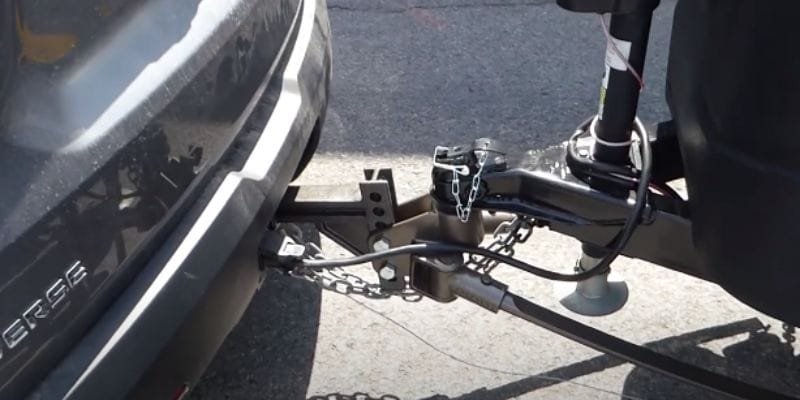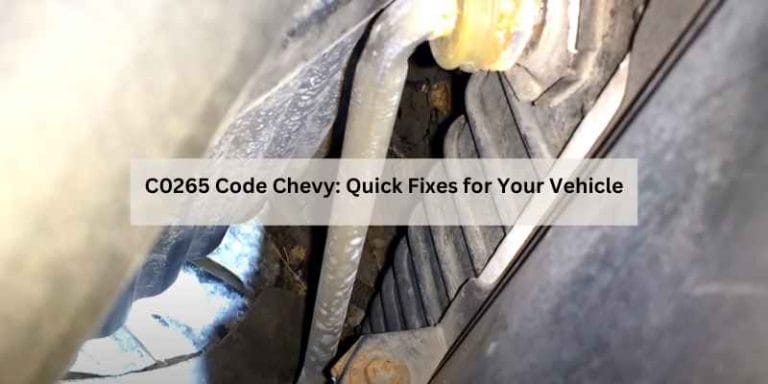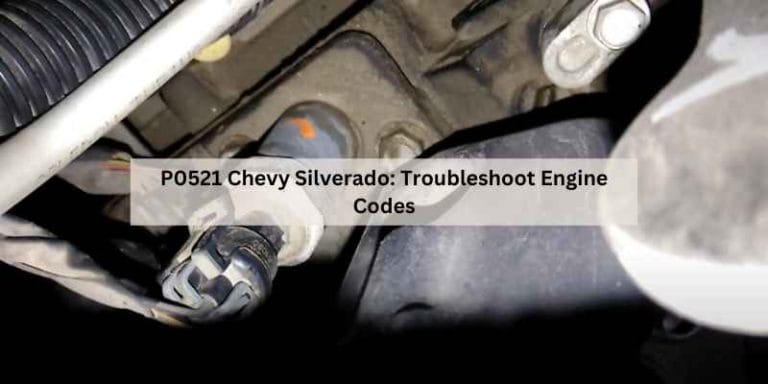Can a Chevy Traverse Pull a Camper? Discover the Surprising Power!
Yes, a Chevy Traverse can pull a camper. Now let’s delve into the details.
The Chevy Traverse is a powerful and capable SUV that has the towing capacity to pull a camper without any issues. With its impressive towing capacity, sturdy build, and advanced towing features, the Chevy Traverse makes for an ideal vehicle to tow a camper.
Whether you’re planning a weekend camping trip or a long road trip with your camper in tow, the Chevy Traverse will provide you with the necessary power and stability for a smooth towing experience. So, if you’re looking for an SUV that can handle your camper, the Chevy Traverse is a great choice.
Proficiency The Chevy Traverse
The Chevy Traverse is a capable vehicle that can tow campers with ease. Experience the power and reliability of the Traverse for your camping adventures.
The Chevy Traverse is a popular choice among families and outdoor enthusiasts alike, thanks to its spacious interior, comfortable ride, and powerful performance. If you’re considering using a Chevy Traverse for towing a camper, it’s essential to understand the capabilities and limitations of this vehicle. In this section, we will explore the overview of the Chevy Traverse and its towing capacity to help you determine if it can handle your camper towing needs.
Overview Of The Chevy Traverse
The Chevy Traverse is a midsize SUV that offers seating for up to eight passengers. With its sleek and stylish design, this vehicle combines functionality with modern aesthetics. Under the hood, the Chevy Traverse is equipped with a robust V6 engine, providing ample power for both daily commuting and towing applications. Its available all-wheel drive system enhances traction and stability, making it a suitable choice for various road conditions.
When it comes to cargo space, the Chevy Traverse doesn’t disappoint. With clever storage solutions and flexible seating configurations, you’ll have no trouble fitting your gear and essentials for your camping trips. Whether it’s camping equipment, luggage, or groceries, the Traverse offers plenty of room to accommodate your needs.
Towing Capacity Of The Chevy Traverse
One of the essential factors to consider when deciding if a Chevy Traverse can pull a camper is its towing capacity. The towing capacity refers to the maximum weight a vehicle can tow without compromising safety and performance. The Chevy Traverse, when properly equipped, can tow up to 5,000 pounds, making it capable of pulling a range of campers and trailers, including lightweight travel trailers and smaller pop-up campers.
To ensure that you’re within the vehicle’s towing capacity, it’s crucial to consider the weight of your camper, along with any additional gear and passengers. You should also take into account the tongue weight, which is the downward force exerted on the hitch ball by the camper or trailer. Proper weight distribution and hitch setup are essential to maintain stability and control while towing.
It’s worth noting that towing capacity can vary based on the trim level and optional equipment of the Chevy Traverse. It’s recommended to consult the owner’s manual or contact a certified Chevy dealer to confirm the specific towing capacity of your Traverse model.
In conclusion, the Chevy Traverse offers a combination of comfort, versatility, and towing capability, making it a suitable choice for pulling a camper. With its spacious interior, strong performance, and towing capacity of up to 5,000 pounds, the Traverse can handle many camping adventures with ease. However, it’s crucial to ensure that you stay within the vehicle’s towing capacity and follow proper towing practices for a safe and enjoyable experience.

Assessing The Towing Capability
Before hitching up your camper to a Chevy Traverse, it’s crucial to assess the towing capability of your vehicle. Ignoring this step can lead to safety hazards and potential damage to your vehicle. In this section, we will explore the factors you should consider to determine if a Chevy Traverse can adequately pull a camper.
Factors To Consider
When it comes to towing a camper with a Chevy Traverse, there are several key factors to keep in mind:
Matching the camper weight and towing capacity
The first and most important factor to consider is matching the weight of your camper to the towing capacity of your Chevy Traverse. The towing capacity is the maximum weight your vehicle can safely tow. It’s crucial not to exceed this limit, as it can lead to strain on your engine, brakes, and suspension system.
To determine your Chevy Traverse’s towing capacity, consult your vehicle’s manual or look for the information on the manufacturer’s website. This will provide you with the specific towing capacity for your model and trim level.
Once you have the towing capacity, it’s essential to match it with the weight of your camper. Remember to include the weight of any additional cargo you plan to bring along. If the weight of your camper exceeds the towing capacity of your Chevy Traverse, you may want to consider a smaller camper or upgrading to a different vehicle with a higher towing capacity.
Ensure proper hitching equipment
Another crucial aspect of ensuring a safe towing experience is using the correct hitching equipment. Your Chevy Traverse will require a suitable hitch receiver, which should be installed by a professional. The hitch receiver will determine the maximum weight your vehicle can tow and the type of camper hitch you need.
There are different types of hitches available, including weight distribution hitches and sway control hitches, which offer additional stability and safety while towing. It’s important to choose the right hitch for your specific camper and vehicle combination to ensure a secure connection.
Consider terrain and driving conditions
Besides assessing the weight and towing capacity, considering the terrain and driving conditions is also crucial. Towing a camper can affect your vehicle’s performance, especially when navigating steep inclines, rough terrains, or adverse weather conditions.
Before embarking on your camping adventure, familiarize yourself with the route you plan to take. Check if there are any steep hills, narrow roads, or challenging terrains along the way. Be mindful of factors like strong winds or extreme temperatures, which can impact your vehicle’s performance when towing.
Remember that towing a camper adds additional weight and alters your vehicle’s handling, so it’s essential to adjust your driving accordingly. Drive at safe speeds, maintain a greater following distance, and anticipate braking distances to ensure a smooth and stable journey.
By assessing these factors, you can make an informed decision about whether a Chevy Traverse is suitable for pulling a camper. Remember that safety should always be your top priority, so never exceed the towing capacity of your vehicle. Take the time to properly match your camper’s weight, install the appropriate hitching equipment, and consider the terrain and driving conditions you’ll encounter along the way.

Preparing The Chevy Traverse For Towing
Towing a camper with your Chevy Traverse can be an exciting and convenient way to explore the great outdoors. However, before hitting the road, it’s important to ensure that your vehicle is properly prepared for the added weight and stress of towing. In this article, we will discuss two key aspects of preparing your Chevy Traverse for towing: upgrading the suspension and brakes, and installing a trailer hitch.
Upgrading The Suspension And Brakes
When towing a camper, it’s crucial to have a suspension system that can handle the extra weight. The Chevy Traverse, in its stock form, is not typically designed for heavy towing. Upgrading the suspension can help improve stability, handling, and overall performance while towing.
To upgrade the suspension, consider installing a set of heavy-duty shocks and struts. These components are designed to provide better support and control when carrying a heavier load. Additionally, you may want to consider adding load-leveling airbags to help balance the weight distribution of the camper and improve the vehicle’s towing capabilities.
Along with upgrading the suspension, it is also essential to ensure that your brakes can handle the increased workload. Towing a camper puts additional strain on your vehicle’s braking system, making it crucial to have proper stopping power.
Consider upgrading your Chevy Traverse’s brake pads and rotors to a heavy-duty or high-performance option. These upgrades can provide better heat dissipation and improved braking performance. It’s also advisable to check the condition of your brake lines, ensuring they are free of leaks or damage.
Installing A Trailer Hitch
A trailer hitch is an essential component for towing a camper with your Chevy Traverse. It provides a secure connection point between your vehicle and the camper, allowing for safe and controlled towing.
When choosing a trailer hitch, make sure to select one that is specifically designed for your Chevy Traverse model and year. Trailer hitches come in different weight capacities, so be sure to choose one that matches the towing capacity of your vehicle and the weight of your camper.
Installing a trailer hitch typically involves attaching the hitch receiver to the frame of your Chevy Traverse. It’s important to follow the manufacturer’s instructions carefully and ensure that the hitch is properly secured and aligned.
Once the trailer hitch is installed, you can connect your camper to your Chevy Traverse using a compatible trailer coupler. Make sure to double-check that all connections are secure and that the safety chains and electrical wiring are properly connected.
Preparing your Chevy Traverse for towing a camper involves upgrading the suspension and brakes, as well as installing a trailer hitch. By taking these necessary steps, you can ensure a safe and enjoyable towing experience with your Chevy Traverse.
Tips For Safe Towing With A Chevy Traverse
Are you considering towing a camper with your Chevy Traverse? With its impressive towing capacity and strong performance, the Chevy Traverse is well-suited for pulling a camper on your next adventure. However, it’s important to keep in mind some essential tips to ensure your towing experience is safe and successful. In this post, we will discuss the proper loading of the camper and driving techniques that will help you tow your camper with confidence.
Properly Loading The Camper
Before hitting the road with your camper in tow, it is crucial to ensure that it is properly loaded. Properly distributing the weight inside the camper not only improves towing stability but also ensures the safety of you and other road users. Here are a few tips to help you load your camper correctly:
- Place heavier items in the lower part of the camper to keep the center of gravity low and maintain stability.
- Secure all loose items to prevent movement while driving, reducing the risk of damage or accidents.
- Check and balance the weight on both sides of the camper, avoiding an uneven load that may affect handling and tire wear.
- Utilize internal storage compartments efficiently, distributing weight evenly throughout the camper.
- Regularly inspect the camper’s tires to ensure they are properly inflated and in good condition to handle the load.
Driving Techniques While Towing
Driving a Chevy Traverse while towing a camper requires some adjustments to your driving style to ensure a safe and smooth journey. Here are some driving techniques to consider:
- Keep a safe distance from other vehicles on the road, allowing for adequate braking and reaction time in case of sudden stops or emergencies.
- Drive at a moderate speed that allows you to maintain control and stability, especially when going uphill or downhill.
- Avoid sudden maneuvers, such as quick lane changes or sharp turns, which can put excessive strain on the camper and compromise your vehicle’s stability.
- Gradually accelerate and decelerate to minimize stress on the towing components and avoid potential sway or fishtailing.
- Regularly check your side mirrors and use extended mirrors if necessary to ensure you have a clear view of both sides of the camper.
By following these tips for safe towing with your Chevy Traverse, you can enjoy your camping trip with peace of mind, knowing that you are well-prepared and taking the necessary precautions. Always prioritize safety and be aware of the limitations and capabilities of your vehicle to have a successful and enjoyable towing experience.
Conclusion
To wrap up, the Chevy Traverse is indeed capable of pulling a camper, thanks to its powerful engine and impressive towing capacity. Whether it’s for a family camping trip or a road adventure, this versatile SUV is well-equipped to handle the load.
So, if you’re in search of a reliable and sturdy vehicle for your camping needs, the Chevy Traverse won’t disappoint. Start planning your next adventure with confidence!







